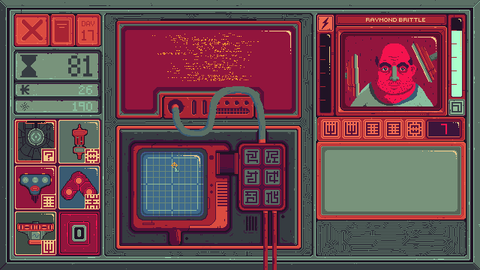Our Verdict
A compelling cyberpunk story told in an imaginative way, and one that will really test your moral compass.
PC Gamer's got your back
The Structure is a dystopian megacity ruled by a government that values order and efficiency above all. And if someone shows any signs of what it considers to be mentally divergent behaviour, it sends in a Mind Scanner (that's you) to probe around in their brain with a series of disturbing, invasive machines and 'cure' them, turning them into its idea of a model citizen.
The problem is, these machines also completely drain the subject of their personality. And what The Structure considers 'mentally divergent' might just be a harmless eccentricity, or a slightly offbeat view of the world. It wants a population of dead-eyed drones who will blindly obey its commands and never question its leadership—and you're going to help it.
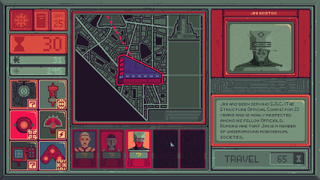
But it's not like you have a choice. It's quarantined (read: kidnapped) your daughter, and the only way you'll ever get to see her again is by working your way up the Mind Scanner ranks. The more patients you cure, the closer you get to a promotion and reuniting with your child. Well, that's what The Structure tells you anyway. Can you really trust it?
The first step on the road to 'recovery' is a mind scan. You strap a pair of goggles to someone's head and beam a trippy digital Rorschach test directly into their frontal lobe. You then diagnose them based on the things they observe in the patterns, by choosing from three possible options. Get three right in a row and you'll move on to the next phase of your brutal treatment plan. Get one wrong and you start back at square one.
You strap a pair of goggles to someone's head and beam a trippy digital Rorschach test directly into their frontal lobe
After a mind scan, you have to decide whether a patient is, in the language of the game, sane or insane. The wording here is blunt and gross and totally lacking in nuance—but that's the idea. This reflects The Structure's inhumane and one-dimensional approach to mental health, which makes it clear they're the bad guys in this story. Seeing the word INSANE stamped on a subject's personnel file, reducing the complexities of their mind, and their struggles, to a single, vague word, is exactly what it wants.
Declare a person sane and you'll earn a small amount of money, but you might get reprimanded and fined by The Structure later if they go on to do something it doesn't like—which could be anything. Its definition of 'normal' is extremely limited. Label a patient insane and it's time to dive into their brain, using those terrible machines to tear out their personality and, in turn, the undesirable mental traits The Structure feels threatened by.
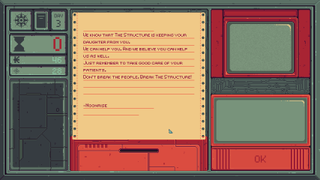
These brain-sucking machines come in the form of bizarre, sinister WarioWare-style minigames. Each one treats a different type of insanity, and has its own unique method of interaction. One has you tweaking the dials on a tuner to reveal negative phrases in a maze of words, then zapping them away. With another you listen out for a Morse code-like series of bleeps and recreate the discordant melody by turning a bank of knobs.
These tactile playthings are imaginatively designed and interesting to look at, but the novelty wears off quickly. After a while, repeating the same relatively small number of interactions begins to feel like a chore. Especially when a subject has a large number of 'insanities' to deal with, which means having to swap between different machines multiple times.
It works with the fiction, showing you just how cruel, matter-of-fact, and routine mental health treatment is in this dystopian future. But it's also quite dull from a pure play perspective. The story is much more engaging, and for me, the real reason I'd recommend Mind Scanners. It takes place over a series of days, and the patients you treat—and how you treat them—can send the narrative down a number of interesting, surprising paths.
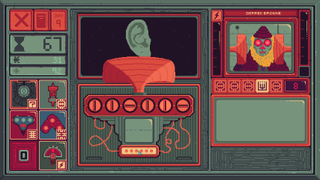
You're regularly torn between being loyal to The Structure, in the hope it'll get you closer to seeing your daughter, and rebelling against them. You can let people go, even if it considers them insane. You can take much longer to cure people, using a special device to restore their personality and keep their mind intact. And you can work with a mysterious resistance group that considers you an ally. There's a lot going on in Mind Scanners.
There's also a nicely designed strategy element. You have 200 seconds a day to treat your patients—and every day, without fail, you have to pay The Structure money to avoid being cast out of the city into the dreaded Outer Zone. This means you're constantly pressed for time, and forever worrying about making enough cash to survive another day.
The temptation to quickly and ruthlessly neutralise someone's personality for a quick payday is always there
Taking the extra time to humanely treat someone might be the kind thing to do, but it could also bankrupt you and ensure you'll never see your daughter again. The temptation to quickly and ruthlessly neutralise someone's personality for a quick payday is always there, and always horrible. Mind Scanners is a constant moral tightrope walk, and with the timer incessantly ticking down, enormously stressful at times.
It's a bleak, uncomfortable game, entirely by design. When you snap one of these machines on someone's skull and root around in their subconscious, you're supposed to feel bad about it—and I did, pretty much every time. I say pretty much, because occasionally Mind Scanners will, cleverly, present you with a patient who is so deeply unpleasant, you actually want to permanently suck the personality out of them with your machines.
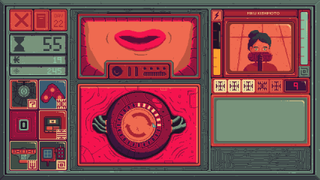
Doing this to an abusive husband so he stops assaulting his wife and child feels good, but is basically erasing his brain and turning him into a mindless automaton right? This is just one of many moral quandaries the game throws at you, and the choices you make have a genuine impact on the story. Mind Scanners drags you into a fascinatingly grim future society, and keeps you there with colourful writing, a striking retro-futuristic art style, and a twisting, turning plot that's full of surprises.
A compelling cyberpunk story told in an imaginative way, and one that will really test your moral compass.
If it’s set in space, Andy will probably write about it. He loves sci-fi, adventure games, taking screenshots, Twin Peaks, weird sims, Alien: Isolation, and anything with a good story.
